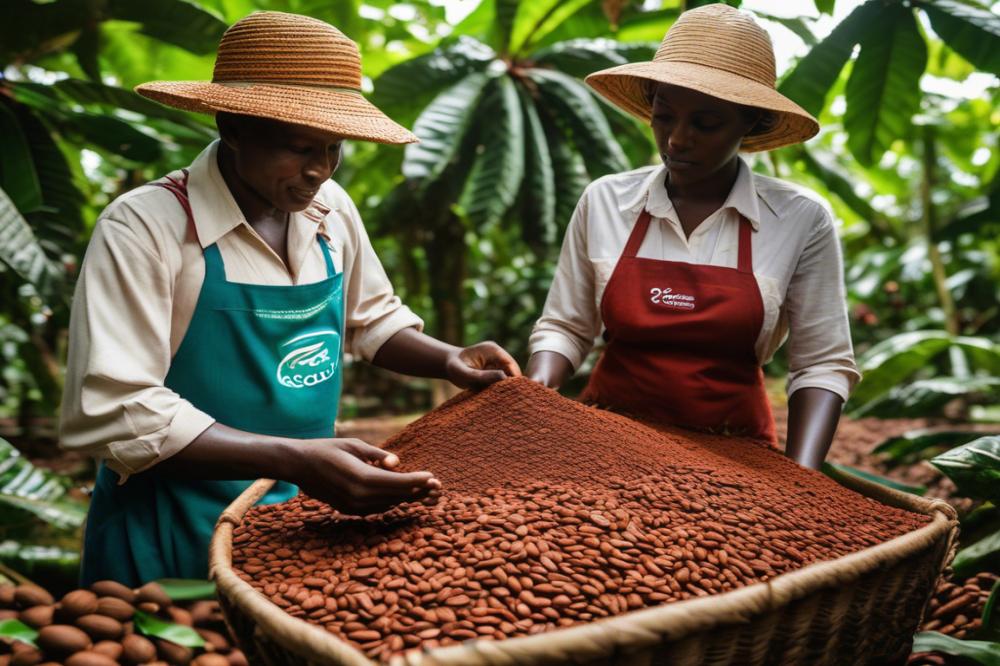Introduction
The global chocolate industry is vast, generating billions of dollars each year. This thriving market provides consumers with a wide variety of chocolate options, from sweet bars to rich brownies. However, behind the scenes, the journey of cocoa is complex and often troubling. Many Cocoa Farmers struggle to make a living in the face of unfair trade practices. The importance of ethical sourcing has never been clearer as consumers become more conscientious about their purchases.
ethical sourcing aims to promote fairness and sustainability in agricultural practices. When farmers receive fair prices for their cocoa, they can invest in their communities and improve their livelihoods. Various initiatives are in place to safeguard these Cocoa Farmers, ensuring they are not exploited. Among these initiatives, Fairtrade certification stands out as a powerful tool for promoting social justice and income stability.
This certification guarantees that farmers receive a minimum price for their cocoa, which helps protect them from fluctuating market prices. Additionally, it allows farmers to join cooperatives that can advocate for their rights and well-being. Consumer awareness is growing, and more people are choosing products that support these ethical practices. Even though traditional chocolate production often neglects the challenges faced by farmers, Fairtrade Chocolate offers a path that prioritizes their wellbeing.
As discussions about environmental impact heat up, finding sustainable chocolate options has become vital. Direct trade models and cooperatives are gaining traction, addressing not only the economic needs of farmers but also the health of our planet. By supporting ethical chocolate, consumers contribute to a more equitable global economy and help sustain the communities that produce these beloved treats.
Understanding Fairtrade Chocolate

Definition of Fairtrade Chocolate
Fairtrade chocolate refers to products made from cocoa that has been responsibly sourced under Fairtrade guidelines. These guidelines prioritize ethical sourcing and aim to create a positive impact on farmers and their communities. Through this approach, consumers can enjoy their favorite treats while supporting social justice initiatives.
Explanation of Fairtrade Certification Process
The Fairtrade certification process is comprehensive and involves multiple steps. Initially, cocoa farmers must form cooperatives. These cooperatives help strengthen farmers’ voices and bargaining power. After that, they must adhere to specific social, economic, and environmental standards. Regular audits are conducted to verify compliance. This process guarantees that farmers receive fair prices and are treated with respect.
Benefits of Fairtrade Certification for Cocoa Farmers
Cocoa farmers enjoy numerous benefits from Fairtrade certification. First, they receive a minimum price for their cocoa, providing much-needed income stability. This helps families support their needs without the uncertainties of market fluctuations. Additionally, the Fairtrade Premium allows farmers to invest in their businesses or communities. The focus on sustainability means that environmentally-friendly practices are encouraged. By supporting farmer cooperatives, Fairtrade fosters direct trade relationships, cutting out exploitative middlemen. This allows farmers to retain more of the value generated from their crops, improving their livelihoods. Furthermore, increased consumer awareness of the impact of their purchases drives demand for ethically sourced products, benefiting farmers on a larger scale.
Economic Impact on Cocoa Farmers

Role of Farmer Cooperatives in Cocoa Production
Farmer cooperatives play a vital role in the cocoa industry. These groups allow individual farmers to band together for better access to resources and markets. By working collectively, they can negotiate better prices for their cocoa beans and improve quality standards.
Cooperatives also support farmers by providing training on sustainable farming practices. Learning to grow cocoa in environmentally friendly ways not only benefits the land but also helps farmers increase their yields. This teamwork fosters a sense of community and enhances social justice among the cocoa farmers.
How Fairtrade Chocolate Provides Income Stability
Fairtrade certification creates a system designed to provide farmers with secure incomes. Unlike fluctuating prices found in the conventional market, Fairtrade sets minimum prices for cocoa. This system allows farmers to plan for the future with more confidence.
Income stability from Fairtrade helps in many aspects of life. Farmers can invest in their families, education, and healthcare, leading to improved quality of life. Moreover, it promotes ethical sourcing, which consumers increasingly value. Positive change begins with better pay and support for those who grow the cocoa.
Comparison of Fairtrade Pricing vs. Conventional Market Prices
When examining pricing, Fairtrade and conventional markets reveal stark differences. Fairtrade prices are typically higher, as they include a premium meant to support local development. In many countries, conventional cocoa prices can drop unexpectedly, leaving farmers in financial distress.
The direct trade model often seen in Fairtrade systems emphasizes relationships between farmers and buyers. This differs from the complex supply chains in traditional markets. As a result, cocoa farmers can receive fair compensation more consistently.
Consumer awareness about the benefits of Fairtrade products has also increased. More shoppers recognize that buying Fairtrade chocolate supports sustainable practices and fair compensation for producers. Ultimately, this shift can lead to lasting change in the chocolate industry, which often prioritizes cost over ethical responsibility.
Social Justice and Fairtrade
Empowerment of farmers and their communities is at the heart of Fairtrade initiatives. Many cocoa farmers struggle with poverty and lack of resources. They often receive low prices for their cocoa beans, leaving them vulnerable. Fairtrade certification addresses this by providing better prices and income stability. Farmers benefit directly from fair wages through farmer cooperatives. These groups foster a sense of community and shared responsibility. Members work together to improve their livelihoods, and that’s vital in the chocolate industry.
Importance of Gender Equality Within Farmer Cooperatives
Gender equality plays a crucial role in the success of farmer cooperatives. Traditionally, women have been marginalized in agricultural sectors. By promoting women’s roles in cocoa farming, Fairtrade supports their empowerment. Access to education and resources allows women to contribute equally. This helps families and entire communities become stronger. Fair trading practices create an environment where everyone’s voice matters. When women thrive, the whole community can flourish.
Investment in Community Development Projects Through Fairtrade Premiums
Fairtrade premiums are an essential aspect of community development. These additional funds come from ethical sourcing practices and are allocated to various projects. Projects often focus on health care, education, or infrastructure. Investment in these areas leads to long-term improvements. Schools and medical clinics become accessible due to these initiatives. When communities invest in their own development, they tackle challenges head-on. Local populations have the power to shape their futures.
Moreover, these projects have positive environmental impacts. By promoting sustainable farming practices, communities protect their land. Healthy ecosystems support better cocoa production. Consumers are increasingly aware of these benefits, choosing products that align with ethical values. This shift in buying habits drives the demand for Fairtrade certified cocoa. Engaging in direct trade establishes better relationships between farmers and consumers. It’s a win-win for everyone involved.
Environmental Sustainability
Fairtrade Practices Promoting Sustainable Farming
Fairtrade certification is not just a label. It represents a commitment to ethical sourcing and responsible farming methods. Cocoa farmers often use agroforestry techniques, blending cocoa trees with other crops. This approach protects the soil and reduces the need for chemical fertilizers. Farmers protect local ecosystems while maintaining a viable income. The focus on sustainable farming leads to healthier crops and better overall environmental health.
Impact on Biodiversity and Reducing Environmental Degradation
Biodiversity thrives in environments where Fairtrade practices are applied. By avoiding harmful pesticides, farmers help preserve various plant and animal species. Healthy ecosystems contribute to the balance of nature, which benefits all living things. Additionally, promoting soil conservation prevents erosion and protects water resources. Such efforts have a marked impact on reducing environmental degradation in cocoa-growing regions.
Comparison of Environmental Practices: Fairtrade vs. Conventional Farming
Conventional farming often relies on monocultures and chemical inputs. This approach can lead to soil depletion and decreased biodiversity. In contrast, Fairtrade encourages a diverse range of crops. Farmer cooperatives often share knowledge about sustainable methods, further enhancing the benefits. While conventional methods prioritize higher short-term yields, they often ignore long-term sustainability. Education plays a vital role in shifting practices. Consumers can support these advances by choosing Fairtrade products. Their choices promote social justice while also lessening the chocolate industry’s environmental impact. Awareness among shoppers can encourage more farmers to adopt these healthier practices.
Consumer Awareness and Market Trends
The growth of Fairtrade chocolate in the global market has been significant in recent years. More consumers are seeking products that support ethical practices. This shift towards ethical consumerism reflects a growing desire for transparency in the chocolate industry. Questions about production methods and fairness have become common among shoppers.
Ethical sourcing is now a topic of interest for many people. With increased awareness, customers want to know where their food comes from. They often prefer brands that prioritize sustainability and social justice. A considerable number of brands have begun to feature Fairtrade certification on their products. This label signals that farmers receive fair wages and that the overall environmental impact is reduced.
Farmer cooperatives play a critical role in this landscape. They help small-scale cocoa producers access the global market. By working together, these farmers can negotiate better prices. Income stability becomes more achievable when they stand united. Moreover, these cooperatives allow for a stronger voice in advocating for workers’ rights and community development.
Consumer awareness is a key factor that influences sustainable practices. When shoppers understand the benefits of choosing ethical products, they make informed choices. This creates a ripple effect in the market, pushing companies to adopt better practices. More brands are embracing direct trade because of this demand. With transparency, consumers can see that their purchases help the communities that grow the cocoa.
As the conversation around cocoa production grows, the industry is adapting. More businesses are recognizing that consumers care about how their chocolate is sourced. Understanding the connections between food choices and their impacts can drive change. Every purchase sends a message. People want to support farmers and ensure a fairer trading system exists.
The movement towards sustainable chocolate is a positive development. Consumers can feel good about their choices, knowing they contribute to fair practices. By aligning their values with their purchases, individuals support a system that uplifts farmers and promotes sustainability.
Challenges Facing Fairtrade Chocolate
Even though Fairtrade chocolate aims to support farmers, several challenges exist. First, there are obstacles in certification and compliance. Small-scale farmers often struggle to meet the rigorous standards for Fairtrade certification. This impacts their access to essential markets. The process can be lengthy and complicated, which discourages some from pursuing it. Many feel overwhelmed by the requirements.
Market saturation is another concern. In the chocolate industry, many non-certified products compete for consumer attention. These options are often cheaper and more accessible. Some buyers may not understand why they should choose Fairtrade chocolate over other brands. As a result, consumers may stick with familiar products rather than exploring ethical sourcing alternatives.
Navigating consumer misconceptions also adds to the struggle. Many people assume that all chocolate brands engage in sustainable and ethical practices. Unfortunately, this belief undermines farmer cooperatives that genuinely work towards social justice and income stability. Education plays a crucial role in helping buyers recognize the value of choosing certified products. Promoting awareness about environmental impact and direct trade can shift consumer habits toward more responsible choices.
Competition from non-certified brands puts pressure on Fairtrade farmers. The reality is that lower prices often attract buyers. Fairtrade products may cost more, but they reflect the true cost of sustainable practices. Without an effective marketing strategy, educating the public can become a daunting task. Maintaining transparency in the sourcing process is vital to addressing these misconceptions.
Final Thoughts on Support for Cocoa Farmers
Fairtrade chocolate plays a vital role in improving the lives of cocoa farmers. Farmers receive fair wages and better working conditions, helping them escape poverty. Many workers invest in their families and communities because of these fair practices. This creates a cycle of positive change.
Continued support for ethical sourcing is crucial. It encourages companies to adopt fair practices, benefitting even more farmers. Without consumer demand for responsibly sourced products, many will struggle to make a living. The chocolate industry can only thrive with the commitment to sustainability at its core.
Consumers should think carefully about their choices. When you choose fair trade options, you contribute to lasting change. Every purchase sends a message that ethical treatment matters. Support farmers by selecting products that prioritize fairness. Together, we can shape the future of the chocolate industry, ensuring it is fair and just for everyone involved.



